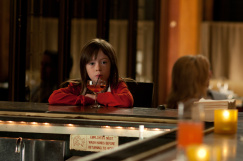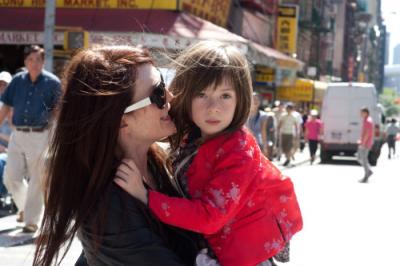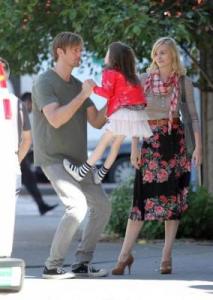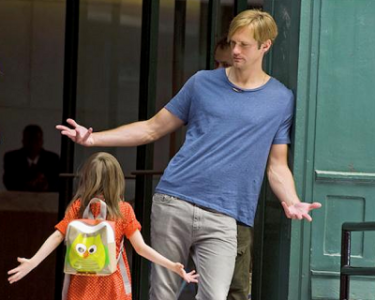By: debbie lynn elias
 Henry James’ 1897 novel, WHAT MAISIE KNEW is as relevant and poignantly heartbreaking and loving today as it was at the time of James’ writing. The story of the divorce of two of the most selfish and reprehensible people on the planet as seen through the eyes of their daughter Maisie, the timeless classic now moves to the big screen and 21st century Manhattan courtesy of screenwriters Nancy Doyne and Carroll Cartwright and co-directors, Scott McGehee and David Siegel who deliver a beautiful character study with a hopeful, and observant, ending. In keeping with the novel, the filmmakers tell the tale entirely from Maisie’s point of view, completely immersing us in Maisie’s loss of innocence at the hands of the callous adults around her.
Henry James’ 1897 novel, WHAT MAISIE KNEW is as relevant and poignantly heartbreaking and loving today as it was at the time of James’ writing. The story of the divorce of two of the most selfish and reprehensible people on the planet as seen through the eyes of their daughter Maisie, the timeless classic now moves to the big screen and 21st century Manhattan courtesy of screenwriters Nancy Doyne and Carroll Cartwright and co-directors, Scott McGehee and David Siegel who deliver a beautiful character study with a hopeful, and observant, ending. In keeping with the novel, the filmmakers tell the tale entirely from Maisie’s point of view, completely immersing us in Maisie’s loss of innocence at the hands of the callous adults around her.
Maisie lives with her parents in what should be an idyllic world. Her mother Susanna is a narcissistic rock star. Her father Beale, a successful businessman. Their Tribeca apartment reflects their affluent lifestyle and modern trappings of “things” while Maisie’s bedroom is sugar and spice and everything nice – light, bright, white with touches of pink – so airy and simple so as to be almost ethereal. While her parents spew venom at each other throughout the rest of the house, Maisie’s room is a world free from hatred and anger, a place where she contentedly immerses herself in the land of Starbright pony make-believe, Crayola and coloring books and all sorts of other childhood joys. And while one would like to see Maisie stay safe and happy in the confines of her room, untouched by the darkness of her parents declining marriage, divorce and separation from the world she knows is inevitable.

Now split between Beale and Susanna as they duke it out in the courts fighting down to ownership of the last knife and fork, Maisie herself becomes the target of possessiveness. With each parent arguing themself to be the better, Beale brings Maisie’s nanny Margo to his new apartment to care for Maisie (and ultimately Beale, as well) and show the Court what a responsible good parent he is while Susanna hooks up with a hot, young bartender named Lincoln. What is clear is that neither parent has any interest in Maisie and each is using her as a bargaining chip to hurt the other. Telling is Maisie’s introduction to Beale’s new home where the 6-year old is forced to carry her own suitcase while Beale cradles his espresso machine.
But Maisie isn’t the only pawn in this chess match. Despite Beale’s allegations of love for Margo and his marriage to her, Beale really only wants her to take Maisie off his hands during the Court approved visitation schedule. Similarly, Susanna is in the studio cutting a new album and heading back on tour and only wants Lincoln to do the same when Maisie is supposed to be in her care. As for Maisie? She takes everything in stride. Calm, patient and observant, ever vigilant, ever observant, looking for the one thing she needs and wants – love.

But a strange thing happens. There’s a lot more to boy toy Lincoln and nanny Margo than meets the eye as each genuinely loves and cares about Maisie. Lincoln, however, is the one more sensitive to her emotions and himself so childlike in ways of the world, starts to consider how the battles and bickering are affecting Maisie. And with children being what they are, Maisie quickly picks up on that, developing a genuine, loving relationship with Lincoln, much to Susanna’s chagrin. Maisie’s affection for Lincoln is real and true as is his for her. Then again, so is Margo’s. But what can Lincoln and Margo do to protect Maisie from the yo-yoing of her parents, while trying to keep their own heads out from under the fray?
WHAT MAISIE KNEW is a master class in acting. As Susanna and Beale, Julianne Moore and Steve Coogan are completely unlikeable – and that’s a good thing. They deliver indelible performances as egomaniacal, self-centered, disinterested parents. These are the kind of people that should be required to get a license in order to be a parent. Neither is equipped to be a parent and not only treat Maisie like a rubber band, pulling and tugging at her emotions and using her as a pawn in their own games, but they treat her like a “thing” or a possession. Both are one note vitriol through the film, executing machinations for their personal antagonistic gain and it works. It’s their catalytic purpose and function as this is all about Maisie. Adding a completely authentic aspect to her performance, however, is Julianne Moore who embodies the middle-aged rock star and does her own singing and stage performance to jaw-dropping effect.

But what buttresses Moore and Coogan is Onata Aprile. As Maisie, she is the pure essence of childlike innocence. Directors McGehee and Siegel stealthily capture the perceptive observational awareness of Aprile’s Maisie, telling the whole story through the eyes of this wounded child; yet, thanks to Aprile, Maisie never appears wounded. She is a like a bird, just waiting to spread her wings, and spread them she does when she opens her heart to, and the hearts of Lincoln and Margo. Maisie sees all and knows all. She also knows where true love is to be found. Watching this story unfold through the soulful expressive wide-eyes of Onata Aprile is a gift of true purity, true innocence. There is nothing forced. Nothing ever feels “acted.” It’s magic. The eyes may be the window to the soul, but Aprile’s eyes are the window to the heart.
Which brings us to the true mastery – that of Alexander Skarsgard and Joanna Vanderham. With Onata’s Maisie as the connective tissues between the two we see love grow and develop before our eyes. Because of Margo’s love and generosity of spirit in her caring of Maisie, Maisie then teaches Lincoln how to love and grow and be responsible, and we see the perfect family develop – Maisie, Lincoln and Margo. Again, it’s the purity of a child and through her eyes that we see Skarsgard and Venderham move from the background to the foreground and truly grow as Lincoln and Margo. Extremely well structured development captured and told not only through the powerful performances and lensing, but the editing. Joyful and freeing is not only watching the chemistry between Skarsgard and April, but the physical interaction of the very very tall and lanky Skarsgard with the tiny little Onata Aprile. There is an effortless ease between them that harkens to watching a child climb on the monkey bars or jungle gym on the playground but with strong safety harnesses in place to catch them if they fall.

As Lincoln, Skarsgard reveals the most dramatic character transformation. Shy, unsure of himself, insecure. Slowly, he changes his posture, his smile, he’s not as grubby, he’s cleaned up more. He becomes more vocal. Slow and deliberate yet perfectly natural and nuanced. As the character grows emotionally, so does his outward appearance in clothing and non-grubbiness. And as Skarsgard develops Lincoln, he also draws us deeper into the heart of the story.
Co-written by Nancy Doyne and Carroll Cartwright, the script is faithful to the James’ novel but opts for a more positive ending, leaving the bleaker scenario for the printed page. Avoiding maudlin sentimentality, the writers deftly navigate the tricky waters with the honesty and purity of character construction, which mantle is then picked up by the cast and directors Scott McGehee and David Siegel. Finding and maintaining a perfect balance between the source material and the script, the duo find the heart of the film through Maisie’s eyes and her eyeline immersing us in her world, in her mindset. As her little hand raises in the air in the classroom, so does ours. As she sits quietly coloring at her child-size table, we feel our own knees scrunch to fit under the tabletop and color with her. Eye level with her ponies and their play farm, in our mind’s eye we help her groom the pretty colored ponies while all assortment of cuddly safe teddy bears look on with a watchful, safe eye. The details captured by the camera are what keep both Maisie and us safe and protected from the turmoil much like Maisie is safe and protected behind a closed patio window riding her tricycle or behind the closed door of her room, seeing, hearing but physically removed to an almost objective, and always reflective, viewpoint.

One of the most gratifying aspects of the film is that Maisie isn’t glued to a tv or video game. She plays with Starbright (great metaphor – horses run free, Maisie needs to run free and be loved). Her turtle is hardly ever in his container. He roams free across tables and climbing up and over her hands. Maisie plays with animals and toys. A drawing Maisie makes with Lincoln depicting a castle and moat filled with ferocious animals in the moat to protect her from the horrors of her parents is quietly brilliant in its design. Maisie thinks. She’s smart, bright. She plays at recess. She paints a beautiful portrait of what childhood should be….when we get rid of Susanna and Beale.
The emotional complexity and layering of WHAT MAISIE KNEW is a gorgeous and powerful construct in character and observational brilliance. The power of love, the purity of a child, the self-sacrifice of adults, the need to stop, look and listen with the eyes and the heart – WHAT MAISIE KNEW is a film that you need to know.
Directed by Scott McGehee and David Siegel
Written by Nancy Doyne and Carroll Cartwright based on the novel by Henry James
Cast: Onata Aprile, Julianne Moore, Steve Coogan, Alexander Skarsgard, Joanna Vanderham












